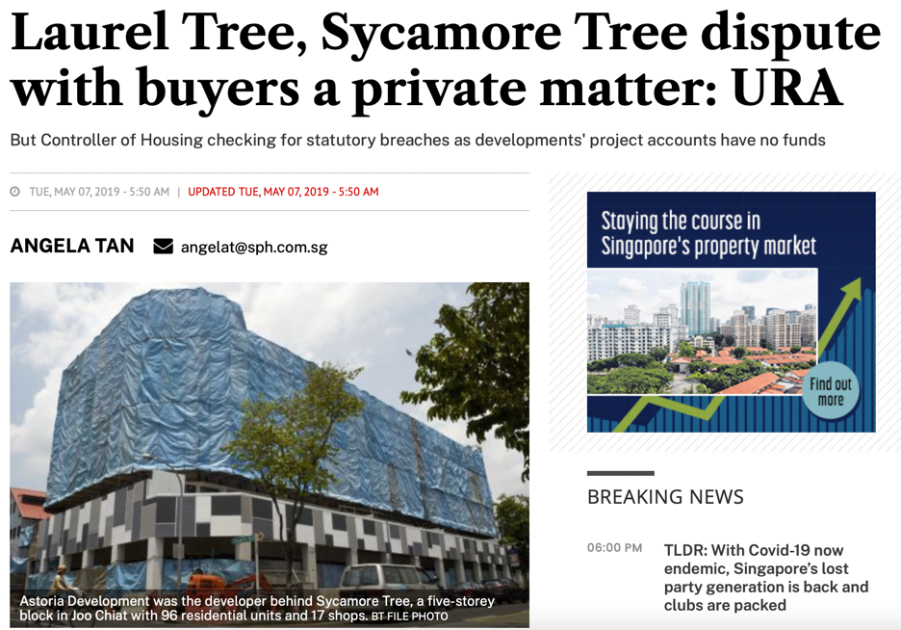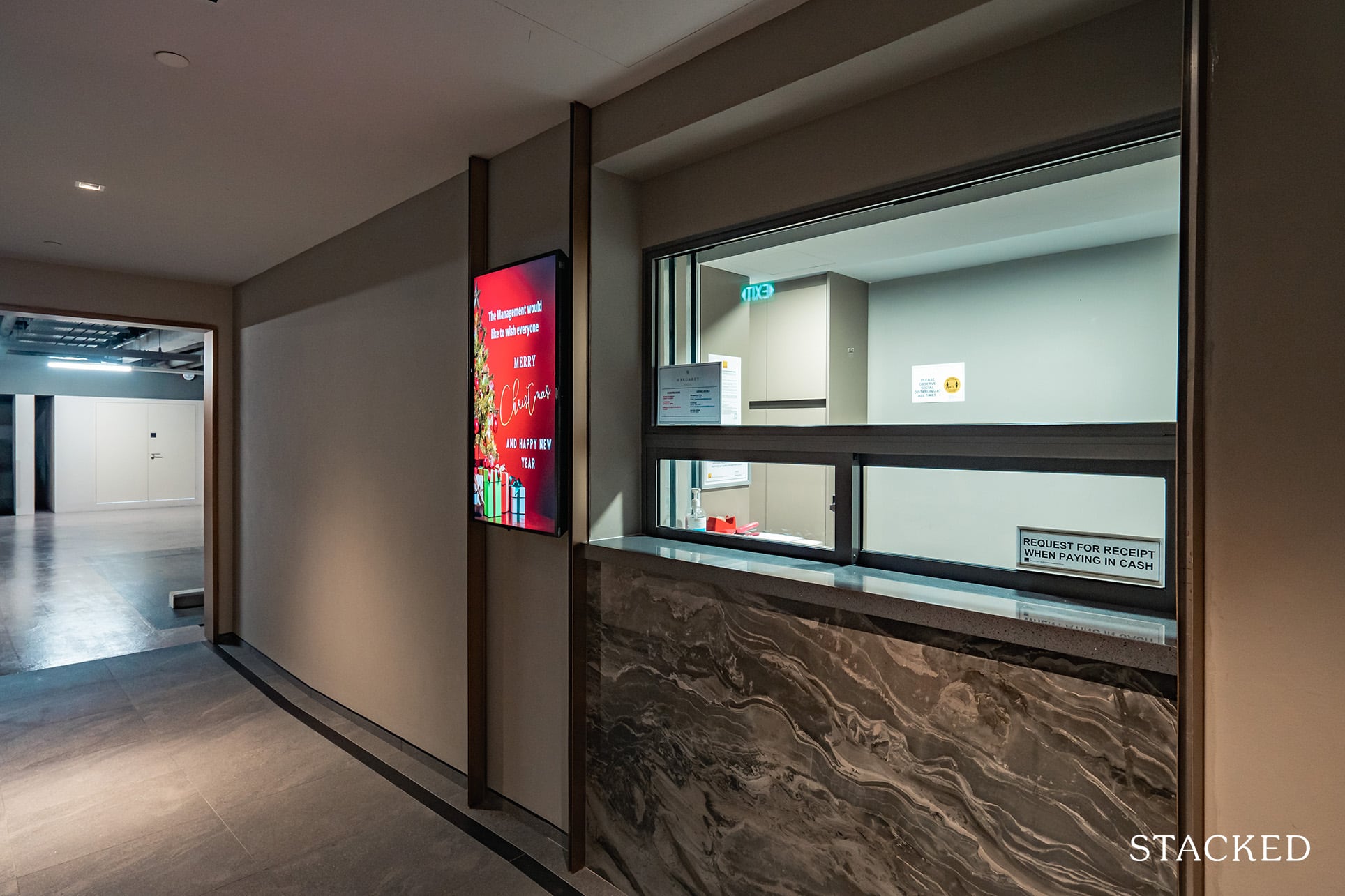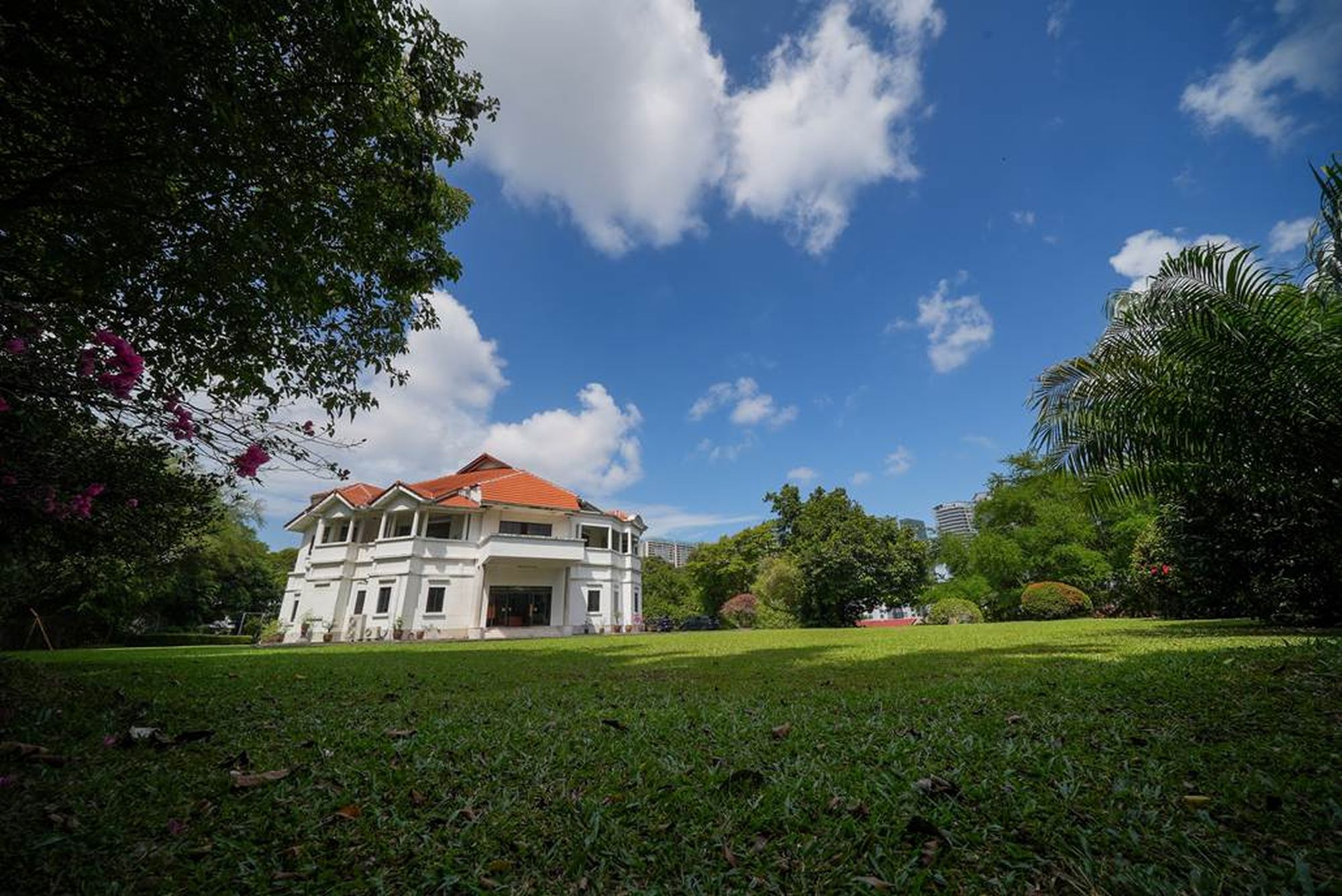I Nearly Bought A Condo With A Ceiling Leak & Depleting Sinking Fund Issue: Why MCST Problems Need To Be More Transparent
October 17, 2022

Of late, we’ve had questions from a reader about the MCST system in Singapore; and about how it’s a little opaque and unfair. If you’re a foreigner or have bought property overseas, you may be struck by how little information there is given to you as a buyer on our MCSTs, or by just how much they’re allowed to keep private. Here’s a quick look at the issues that arise – and what you may be forced to just accept:
So many readers write in because they're unsure what to do next, and don't know who to trust.
If this sounds familiar, we offer structured 1-to-1 consultations where we walk through your finances, goals, and market options objectively.
No obligation. Just clarity.
Learn more here.
The MCST issue from a more external perspective
S had just moved to Singapore from New York, and noted a huge difference in the way we do things:
“When I was looking at apartments there, it was common to ask for and receive the last three years of a building’s audited finances. Depending on the type or age of the building, some banks may also require this information when analysing the mortgage application. In this experience, I received this information every time that I asked for it. Usually, if a buyer is interested in the unit, this is an expected part of their due diligence process.”
In Singapore however, asking for the audited finances of a condo will either draw blank stares, or flat-out refusal. Unless you’re an owner, condo management will almost never disclose the information.
Editor’s note: We’ve spoken to BCA to clarify: Potential buyers are able to obtain information or documents that are retained by MCST as outlined under BMSMA Section 47. The types of information and documents, including financial statements, are also listed under section 47.
“I really only asked for this information for 1-2 places that I viewed and I really liked,” S says, “Each time though, the seller’s broker said that it was an unusual request and they normally wouldn’t be able to get that information. I never did receive any in the end.”
Thankfully for S, this didn’t become a case of major buyer’s remorse for her. It could have been worse though, but she, fortunately, was able to bypass this when she was outbid for an earlier apartment that she had her eye on.
This was a boutique condo, which provided little detail about its maintenance and fees: “I was originally drawn to the building because it was smaller and felt more private and intimate. In the end I was outbid which was lucky for me.”

As it turns out, the intended project had a leak in the rooftop pool, that significantly ramped up maintenance costs to repair. At the same time, it caused issues with the unit directly below it, as the pool leaked into the apartment:
“A small increase of $100 to the monthly maintenance might not be a huge deal but what about $1,000?
The unit’s owner is suing the building. It might not be a big issue if the cost is shared from an outstanding sinking fund or across hundreds of owners. However, this particular building only has 63 units.
I would have been extremely upset if I had to deal with increasing monthly maintenance soon after buying, and then having to deal with litigation costs and subsequently the settlement cost.”
Why don’t we check maintenance funds in Singapore?
The simple reason is, we assume the governing authorities have it in hand. As most condo management will tell you, their records are vetted by the authorities every year. The MCST is audited, and the certified true copy of the audited accounts will be sent to the Commissioner of Buildings (COB).
Editor’s note: Here’s what BCA has provided:
While the BMSMA mandates that audited statements must be included in the AGM agenda to be adopted by the general body, the BMSMA does not empower COB to keep records or validate the audited statement accounts. Section 17(5) of the BMSMA requires that the owner developer file an audited account with the Commissioner within 28 days after the accounts of MCST maintenance fund have been audited (within 4 months before the 1st AGM in accordance with Section 23 of the BMSMA). It is the developer’s responsibility to keep the accounts of the MCST until they are handed over to the council of the MCST. For subsequent AGMs, there are no provisions for MCST to file the audit accounts with COB.

While condo developers have gone bust before finishing a project (Laurel Tree and Sycamore Tree being the most recent examples), we haven’t yet heard of any MCST running out of funds to maintain a condo. As such, it may be that no one checks simply because the situation seems so rare, no one is really looking into it.
The opacity is not a great thing to live with
S doesn’t agree with just accepting the opacity of condo management:
“From a buyer’s perspective, understanding your financial risk is obviously important. What if a small sinking fund gets wiped out because the building needs brand new lifts, or gets sued, or any number of life’s issues?…
…During the purchase process, are there even practices in place that search for litigation against or outstanding debt lodged against the entire building?”
With regard to the purchase process, we can tell you that banks at least do their research. It’s not unheard of for banks to deny loans for condos, while the MCST is currently embroiled in some form of litigation. Buyers, however, may not know this (until, of course, their loan application is denied and the bank explains it to them).

However, it’s rare for anyone to check the sinking fund or other maintenance ledgers, unless they’re considering an en-bloc without redevelopment (e.g., a company is buying over the whole block as a rental asset). Buyers of individual units are seldom as particular.
The details can be revealed to owners but not to outsiders; so buyers are reliant on the seller being willing to request and produce the financial statements.
Uncertainty over what MCSTs can or cannot do
S notes that she only saw the by-laws after the first meeting; these weren’t well publicised beforehand. Certainly, few sellers or agents bother to brief buyers on this – and in the current system, it’s the buyers’ job to unearth these details.
Even so, we find that most buyers are unaware of the difference between by-laws and regulations; or what exactly the MCST can enforce (we have an article on that here). We’re also quite fuzzy on how exactly the MCST can use the maintenance money.
More from Stacked
Upgrading To A Condo By 35: Is That Still Possible For The Average Singaporean In 2025?
The idea of upgrading from an HDB flat to a condo is a familiar one for Singaporeans. But given how…

Property Market CommentaryYour Condo Management Or MCST Can Affect Your Future Profits: 7 Must Know Tips To Deal With Issues
by Ryan J. OngIn the notorious case of Neptune Court, for instance, the condo management used the condo’s funds to pay for a failed defamation suit against some owners (they were forced to repay $420,000 into the estate fund).
Most recently, we also heard a surprise that owners can be forcibly evicted for unpaid maintenance fees, as was the case with Arc @ Tampines. The amount ballooning to $36,000, by the way, is totally possible as your MCST can impose interest rates of around 15 per cent per annum.
This issue seems to be an evolving one, and we’re slowly laying the groundwork for what’s permissible as the years roll by.
What should change in the MCST system?
S had some suggestions on what changes would work in the MCST system:
“I see that a good MCST brings value in two ways. The first is to provide a comfortable living environment from a day-to-day aspect. The second is to maintain the value of the building and subsequently the value of your home. In an ideal world, the relationship between owners and MCST’s should be an equal two-way street with both parties sharing the same mindset.
In terms of sharing building financials to prospective buyers, I honestly do not see why that is an issue. If the financials are good, what kind of repercussions would buildings face for sharing a report? Why would someone go around pretending to be a buyer to obtain building reports?
Generally, it seems that MCST systems still operate in an old-school fashion. Bringing them up to date with technology (hello, iCondo) or other methods is probably an easy way to make a quick but significant improvement. That said, I would definitely get feedback from other people on this question since I have limited experience and by no means an expert on this.”
We’d venture to say few are experts on MCST issues, as they’re seldom discussed topics. Property management is in some ways a closed world, with its own set of specialists. But S is not the first to bring up the issue of opaque financials; and more buyers are now asking if BCA or the COB can provide such details.
Another suggestion, which we’ve increasingly often, is that owners should be involved with picking the very first MCST put in place – usually, this is chosen by the developer. To date, this is an element that most buyers have had no control over.
Editor’s note: The developer does not choose/’handpick’ the first MCST. The management corporation “MC” also referred to as “MCST” is automatically made up of all subsidiary proprietors (SPs) i.e. unit owners. During the initial period, the developer acts as the interim council until the first council is elected (via voting by the MC) at the first AGM. Subsequently, MCST council members are generally elected at each AGM, including the 1st AGM and up to 14 council members can be elected. All successful buyers i.e. unit owners/subsidiary proprietors “SPs” have the right to vote (BMSMA section 53) to elect a council at the first AGM. Under the BMSMA, there is a voting process for the council election, and is based on one vote- per-lot basis. The eligibility criteria for election to the MCST council are found in section 53(6) of the BMSMA.
In the meantime, our ability to assess an MCST is based purely on what we can see: whether the facilities seem well maintained, whether the guards are polite, whether the by-laws seem reasonable, etc.

S has some basic things she looks for, in lieu of transparent MCSTs:
“The easiest way would be reviewing the building’s financials against the physical condition of the building. But without that, I might look at a couple of things:
- Building condition versus building age
- Anything that might look super expensive to fix or so unique that it would be a custom job to fix (like the lift at The Palisades on Pasir Panjang Rd) and the current condition looks like it hasn’t been well taken care of
- Do the building staff look happy to be working there? It’s like any office environment, if people are underpaid or ill-treated, chances are there are underlying issues with management.
- Are there a ton of notices put up regarding rules and regulation? Maybe that means neighbourly disputes are being handled by a top-down enforcement of rules. And who enjoys when one person ruins it for everyone?
- If the building has few units but a lot of recent transactions. Why is everyone selling?
With regard to the notice board though, we’d say that quite often it reflects on some problem tenants rather than management issues. When there are repeated notices not to park bikes in a certain area, for instance, this tends to be directed at the one or two families who keep doing it.
What we would look for is the tone of the messages – fussy or unreasonable MCSTs tend to take on a hectoring voice, often involving threats, spelling out long fines and quoting passages from by-laws, etc. Sometimes, there are cases like Castle Green, where the MCST uses name-and-shame methods. These are usually signs of a toxic MCST in place.
We’ll take a deeper look at this issue and what can be done shortly, follow us on Stacked, as we check out how the MCST situation is changing. We’ll also provide you with in-depth reviews of new and resale condos on the market.
Cover photo credit: The Spruce
Editor’s note 27 Oct: We are sorry for some of the inaccuracies in parts of the piece. Much of the information that we’ve written here is what’s happening on the ground, our attempts to reach several MCSTs in providing such documents proved difficult either due to lack of awareness in having to provide the documents, or just not wanting to provide it as it is extra work for them. Whether it is from our experience as buyers, or from agents, it’s not straightforward to get the desired information.
At Stacked, we like to look beyond the headlines and surface-level numbers, and focus on how things play out in the real world.
If you’d like to discuss how this applies to your own circumstances, you can reach out for a one-to-one consultation here.
And if you simply have a question or want to share a thought, feel free to write to us at stories@stackedhomes.com — we read every message.
Ryan J. Ong
A seasoned content strategist with over 17 years in the real estate and financial journalism sectors, Ryan has built a reputation for transforming complex industry jargon into accessible knowledge. With a track record of writing and editing for leading financial platforms and publications, Ryan's expertise has been recognised across various media outlets. His role as a former content editor for 99.co and a co-host for CNA 938's Open House programme underscores his commitment to providing valuable insights into the property market.Need help with a property decision?
Speak to our team →Read next from Homeowner Stories

Homeowner Stories We Could Walk Away With $460,000 In Cash From Our EC. Here’s Why We Didn’t Upgrade.

Homeowner Stories What I Only Learned After My First Year Of Homeownership In Singapore

Homeowner Stories I Gave My Parents My Condo and Moved Into Their HDB — Here’s Why It Made Sense.

Homeowner Stories “I Thought I Could Wait for a Better New Launch Condo” How One Buyer’s Fear Ended Up Costing Him $358K
Latest Posts

Singapore Property News Singapore Could Soon Have A Multi-Storey Driving Centre — Here’s Where It May Be Built

Singapore Property News Will the Freehold Serenity Park’s $505M Collective Sale Succeed in Enticing Developers?

Singapore Property News You Can Now Buy Part Of A $300M Singapore Bungalow — But You Can’t Live In It



































16 Comments
What also surprises me is that monthly mcst fees (maintenance & sinking funds) are not std info in property listings
Good article and timely
This article is published very timely. Especially with the escalating prices of property and the resistance of old school owners who tend to be part of MC, it gets harder for potential buyers to get full disclosure of any information from the property agent. Maybe STACKED can start a forum and be the voice of potential buyers or even sellers when it comes to MCST disputes and how to handle them. Perhaps getting speakers from the respective authorities would help to clarify many questions that I am sure many owners and buyers would like answered.
May I suggest that you spend time studying the BMSMA and BMSMR and write another article correcting the misinformation in this one?
The law and regulation already makes the items you mention transparent, including to prospective buyers.
S47 specifically allows a prospective buyer to require an MCST to produce the info stated there, including the minutes of the AGM and the statement of accounts, by paying the fee. S38 specifies how the MCST can use the management fund or not.
You might also consider interviewing some experts, lawyers, managing agents or council members to improve your knowledge on MCSTs and councils.
This is very interesting. Yes an article on how s47 works might be very useful. If the fee isn’t large, then I don’t see why it isn’t a standard practice for all prospective buyers to purchase such information. If anyone has experience using s47, please share for our knowledge thank you, including how much the prescribed fee tends to be.
The fee is stated in Regulation 11 of the BMSMR.
Since when did authorities like COB vet certified true copies of audited accounts of MCSTs every year? I hope your next article corrects some of these points made, especially with reference to the BMSMA. An accredited strata manager or lawyer should know better.
If the MCST council is made up of owners who are property agents (owning 2 or more units) who rent out their residential for income, director from contractor/renovation firms, or shop operators (from mixed strata estates) you are likely to be disadvantaged in many ways.
It is very important to have the monthly financial statements bought which I have been buying for the past 4 years. It is the only way to question why levies are to be collected for improper expenditures on maintaining the estate building. I am surprised to note that Condo only imposes 15 per cent per annum in late payment, ours stay at 24 per cent per annum since I came back to stay in this old, walk-up apartment in late 2002.
I am very interested on topics of MCST which are very seldom discussed.
Most of us are not well taught on the financials of buildings maintenance and sinking funds.
It would be very helpful ongoing topics!
Love it. Thank you stackedhomes!